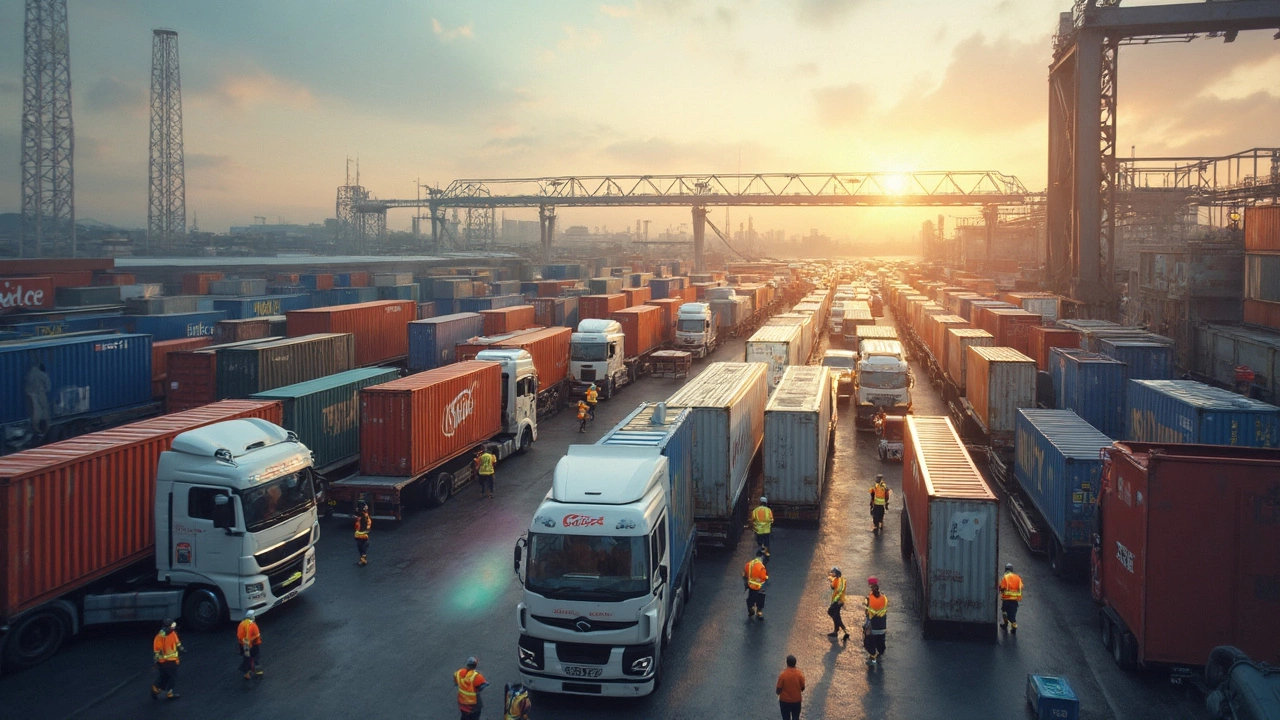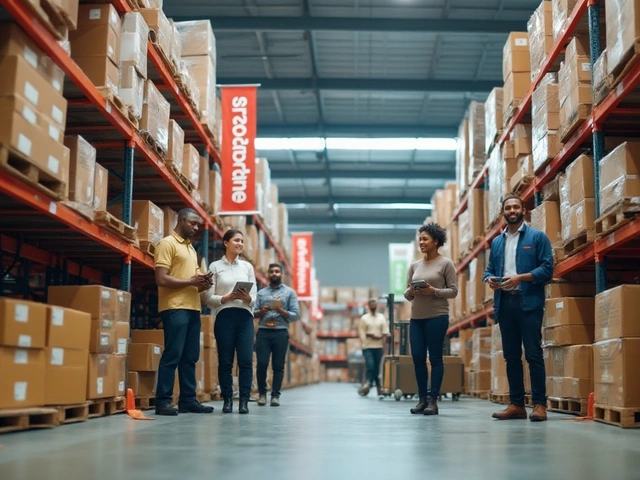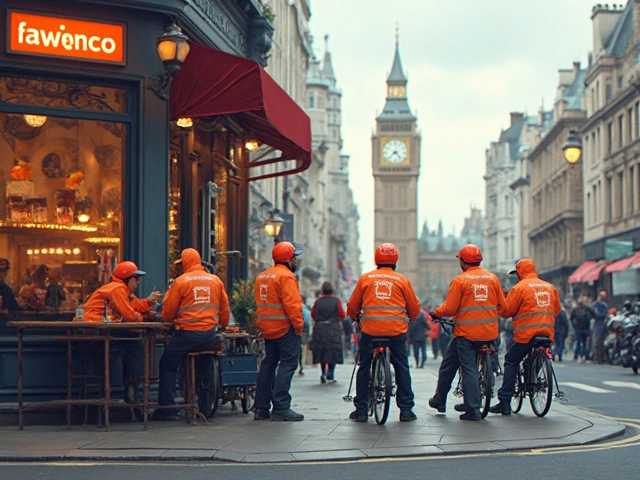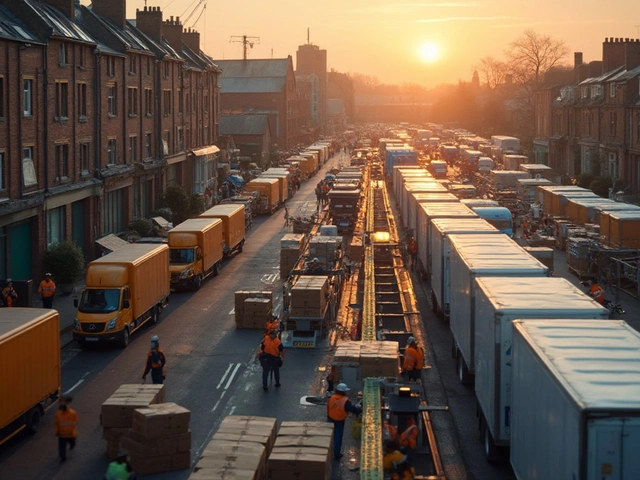Ever wondered how your favorite gadgets or clothing make it to the shop just in time? It's all down to logistics companies, the unsung heroes working behind the scenes. These companies handle the complex dance of shipping, storing, and delivering products worldwide.
First up, let's talk about some of the biggest names in the game. Companies like DHL, FedEx, and UPS are household names, and for good reason. They have massive networks that make sure your package can get from point A to point B anywhere on the globe. They're always on the lookout for new ways to speed up delivery times and cut costs - like using electric delivery vans or experimenting with drone technology.
- Global Giants in Logistics
- Innovative Services and Technologies
- The Role of Local Logistics Companies
- Tips for Choosing a Logistics Partner
- Future Trends in Logistics
Global Giants in Logistics
When you think of logistics companies, a few big names probably pop into your head. Companies like DHL, FedEx, and UPS are titans in the field, known for their vast networks and innovative approaches.
DHL, a German powerhouse, operates in over 220 countries and territories. They offer a range of services from international express deliveries to supply chain management. What sets them apart is their commitment to green logistics, aiming to achieve zero emissions by 2050. That's a big leap towards a cleaner future.
Meanwhile, over at FedEx, headquartered in the US, they’re famous for their overnight shipping services. With a massive fleet of aircraft, FedEx ensures rapid delivery across continents. They're also experimenting with autonomous delivery solutions, like robots and drone-like vehicles, in urban areas — all in the name of speeding up that doorstep drop-off.
Then there's UPS, another American giant, renowned for its efficient package delivery. They introduce cutting-edge technology to optimize routes and enhance delivery accuracy. UPS is also heavily investing in sustainable solutions, using blended fuel trucks and developing alternative delivery methods to reduce carbon footprints.
Here's a quick look at their global reach:
| Company | Countries Served | Fleet Size |
|---|---|---|
| DHL | 220+ | Over 250 aircraft |
| FedEx | 220+ | 676 aircraft |
| UPS | 220+ | 500 aircraft |
These logistics giants aren't just about moving packages. They're about embracing technology and sustainability to stay ahead in a fast-paced world. For businesses and customers, understanding what these companies offer can open the door to innovative shipping solutions that are faster, smarter, and more eco-friendly.
Innovative Services and Technologies
In the logistics world, efficiency isn't just about speed; it's also about smart, tech-driven solutions. Imagine this: you order a new smartphone, and it arrives at your door faster than you expected. That magic often comes down to technology game-changers in the logistics space.
Take automation, for example. Warehouses run by companies like Amazon are harnessing robotic technologies to streamline operations. These robots can pick, pack, and even scan items way faster than humans could. This results in faster shipping times for customers. Plus, it reduces the risk of human error.
Blockchain is another hot topic. It’s not just for cryptocurrencies anymore. It's being used by logistics companies to enhance transparency in the supply chain. With blockchain, every step of the product's journey is recorded and available to view. This means less room for fraud and mistakes, as everything is documented in real-time.
Then there's route optimization technology. For global delivery giants like FedEx, optimizing delivery routes means saving fuel, time, and money. By using AI and predictive analytics, these companies can determine the most efficient paths, avoiding traffic jams and cutting down on delivery times.
Let's not forget about drones and autonomous vehicles. While we're probably a few years away from these becoming the norm, companies are already testing deliveries by drones to remote locations. Imagine living in a rural village and getting a delivery from the sky. That's the kind of innovation we're talking about!
And if you're into data, here’s something for you: a lot of logistics companies rely heavily on smart data analysis to predict trends like peak shopping periods or potential supply disruptions. This proactive approach lets them prepare in advance, so customers get uninterrupted service.
Incorporating cutting-edge technologies is not just about keeping up with others but also about setting new standards that benefit both businesses and customers alike.

The Role of Local Logistics Companies
When it comes to logistics companies, global giants often steal the spotlight, but local companies play a crucial role too. They're the hometown heroes who make sure your goods get where they need to go, especially in areas that aren't on the map for global players. These local whizzes know the lay of the land better than anyone else, giving them a real edge.
Here's something cool: local logistics companies are like the Swiss Army knives of the transport world. They offer personalized services and flexible solutions to meet their clients' unique needs, whether it's dealing with a tricky delivery spot or scheduling around local holidays. They often work closely with businesses to design custom logistics strategies, helping them save time and money in the process.
Let's not forget their role in supporting local economies either. When you opt for local logistic services, you're not just getting stuff delivered; you're also supporting local jobs and businesses. Plus, with their focus on community, these companies often stay ahead of local regulations and sustainability standards, which can be a big plus for businesses looking to keep their carbon footprint in check.
For instance, in cities like Auckland, you'll find a variety of local logistics providers who are experts in handling New Zealand's unique geographical challenges. They can navigate those windy roads and deliver to remote areas where bigger firms might struggle.
Looking for the right logistics partner? Make sure to consider local options. Their on-the-ground expertise and personalized service could make all the difference for your business. Whether you're shipping kiwi fruit or kitschy souvenirs, local companies might just be your best bet.
Tips for Choosing a Logistics Partner
Choosing the right logistics company is a bit like finding the perfect roommate—it's essential for peace of mind and smooth operations. So how do you pick the best fit for your business? Here are some no-nonsense tips to help you out.
First, check the track record of the company. Do they have a reputation for delivering on time? Look for companies with high customer satisfaction ratings, as this can save you a lot of headaches down the line. Feedback and reviews from other businesses can be super insightful.
- Network and Coverage: Consider the company's network. Do they have the global reach or specific regional expertise you need? If you often ship internationally, a company with a vast global reach, like DHL or FedEx, might be the way to go.
- Technology and Innovation: Investigate if they use the latest tech and logistics solutions. Whether it's real-time tracking or AI-driven route optimization, these features can streamline your supply chain.
- Cost-effectiveness: Of course, budget matters. Compare pricing structures but don't just leap for the cheapest option. Weigh the services offered against cost, and remember that sometimes you get what you pay for.
- Customer Service: Great customer service is a must. You want a logistics partner who responds quickly and effectively to queries or issues. Test it out—give them a call and see how they handle your questions.
Finally, find a company that aligns with your business values. Whether they prioritize sustainability by using eco-friendly practices or excel in handling urgent deliveries, make sure they're on the same page as you. Following these tips will set you up for a successful partnership and ensure your supply chain runs like a well-oiled machine!

Future Trends in Logistics
Alright, let's get into what's next for the logistics companies. The landscape is buzzing with potential game-changers like technology advancements, eco-friendly practices, and new ways of managing supply chains. All this makes the logistics world more exciting than ever!
One trend gaining serious traction is automation and robotics. Warehouses are seeing a wave of robots doing everything from sorting to packing. This not only speeds things up but also cuts down on human error. And hey, who doesn't like things getting done faster, right?
Then there's Artificial Intelligence (AI), which is becoming a logistics staple. AI tools help predict demand, manage loads, and optimize routes. Imagine trucks taking the quickest path based on real-time traffic data? It's a logistics dream come true.
Another big deal is sustainability. With climate change on everybody’s mind, logistics companies are under pressure to cut emissions. We're talking about everything from electric delivery vans to biodegradable packaging. Some companies are even experimenting with carbon-neutral shipping.
Now, for the tech enthusiasts, blockchain tech is shaking things up with its promise of transparency and security. It holds the potential to track shipments like never before, ensuring everything is above board and no funny business with cargo.
Check out below some stats on logistics tech usage:
| Technology | Usage (%) |
|---|---|
| Automation & Robotics | 45% |
| AI Tools | 37% |
| Blockchain | 22% |
Finally, there’s a push for more localized logistics, meaning smaller hubs closer to end points. This model reduces travel distances and can often be cheaper and quicker. It's a bit like setting up shop right in the customer's backyard.
So, whether it's robots zooming around warehouses or AI plotting the best delivery routes, logistics companies are gearing up for a future that's both tech-savvy and green. And who knows, maybe drones dropping parcels at your doorstep won't be science fiction anymore.





